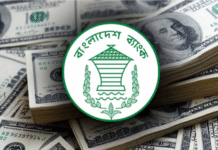
- Front view of Bangladesh Bank
The country’s banks are facing difficulties to meet the businessmen’s demands for low cost finance as a contingency measure to help overcome the setback in business due to the prolonged political crisis.
The bankers also expressed concern that the non-performing loans (NPL) would be increased by the end of the year.
Businessmen are demanding loan facilities from the banks to recover the losses as they could not pay timely as their business activities are now almost suspended.
Bangladesh Bank, however, has announced providing some incentives and relaxing conditions on loans, considering the consequences of the situation.
Bangladesh Bank holds a meeting with the commercial banks and businessmen today to decide how the special incentive could be given to the businessmen badly affected by the political unrest.
“Due to the political unrest, both the banks as well as the businessmen are suffering. So, who will take the benefit and how much it would be have to be decided,” Bangladesh Bank Executive Director M Mahfuzur Rahman told the Dhaka Tribune.
Pubali Bank Managing Director Helal Ahmed Chowdhury said keeping the non-performing loans (NPL) under control is the big challenge for the banks at the end of the year, as transports do not move and production being hampered. “Under this circumstance, the banks will face pressure to meet the demand of businessmen.”
Bangladesh Garment Manufacturers and Exporters Association (BGMEA) demanded low cost loans to pay wages for next four months as they were facing fund shortage due to failure of shipment caused by the political unrest.
Of their other demands, garments and backward linkage industry should not be classified in next two years from Q4 of 2013. They also appealed to block the term loan, project loan, loan against trustee receipt, Murabah Post Import (MPI) and installment without any interest for next two years.
“The demands of the apparel sector are negative for the growth of banking sector,” Prime Bank Managing Director Ehsan Khasru said. They demanded interest block, rearranging loan instalments for two years, labor wages for four months. “The demands may be justified, but banks are not capable to fulfill them.”
He said the banks’ major responsibility is to pay depositors a certain percentage of interest as we already committed. “We all are demanding for one side of businessmen, but nobody is talking about depositors’ interest.”
He said the affected businessmen could get support under the bailout process, but the banks are not capable enough to give the support as every bank operates marginally. “So, we have to think who is going to give the bailout programme.”
The central bank might give us instruction, but where the money is going to come from, he said. “This question is unresolved yet. We need a solution,” said Ehsan Khasru.
‘We do not need of that high forex reserve of $18bn. This reserve can be used for bailout package,” said the senior banker, recommending that the central bank could release the reserve as compensation package by taking consent of the government instead of putting pressure on the banks.
“The central bank can refinance the affected businessmen at lower rate by using the package,” he said.
Bangladesh Bank already announced cutting interest on loans taken from the export development fund and allowing the member manufacturer-exporters of Leather Goods & Footwear Manufacturers & Exporters Association of Bangladesh (LFMEAB) and Bangladesh Ceramic Wares Manufacturers’ Association (BCWMA) to take EDF finance for bulk imports against estimated requirements for up to one year, based on their export performance over the preceding year.
It asked the scheduled banks to offer some privileges for the small and medium enterprise sector hit by political unrest.
The central bank also provided $25m loan to fire-ravaged Standard Group from EDF with 1% interest for helping its business to revive.
The country’s banks are facing difficulties to meet the businessmen’s demands for low cost finance as a contingency measure to help overcome the setback in business due to the prolonged political crisis.
The bankers also expressed concern that the non-performing loans (NPL) would be increased by the end of the year.
Businessmen are demanding loan facilities from the banks to recover the losses as they could not pay timely as their business activities are now almost suspended.
Bangladesh Bank, however, has announced providing some incentives and relaxing conditions on loans, considering the consequences of the situation.
Bangladesh Bank holds a meeting with the commercial banks and businessmen today to decide how the special incentive could be given to the businessmen badly affected by the political unrest.
“Due to the political unrest, both the banks as well as the businessmen are suffering. So, who will take the benefit and how much it would be have to be decided,” Bangladesh Bank Executive Director M Mahfuzur Rahman told the Dhaka Tribune.
Pubali Bank Managing Director Helal Ahmed Chowdhury said keeping the non-performing loans (NPL) under control is the big challenge for the banks at the end of the year, as transports do not move and production being hampered. “Under this circumstance, the banks will face pressure to meet the demand of businessmen.”
Bangladesh Garment Manufacturers and Exporters Association (BGMEA) demanded low cost loans to pay wages for next four months as they were facing fund shortage due to failure of shipment caused by the political unrest.
Of their other demands, garments and backward linkage industry should not be classified in next two years from Q4 of 2013. They also appealed to block the term loan, project loan, loan against trustee receipt, Murabah Post Import (MPI) and installment without any interest for next two years.
“The demands of the apparel sector are negative for the growth of banking sector,” Prime Bank Managing Director Ehsan Khasru said. They demanded interest block, rearranging loan instalments for two years, labor wages for four months. “The demands may be justified, but banks are not capable to fulfill them.”
He said the banks’ major responsibility is to pay depositors a certain percentage of interest as we already committed. “We all are demanding for one side of businessmen, but nobody is talking about depositors’ interest.”
He said the affected businessmen could get support under the bailout process, but the banks are not capable enough to give the support as every bank operates marginally. “So, we have to think who is going to give the bailout programme.”
The central bank might give us instruction, but where the money is going to come from, he said. “This question is unresolved yet. We need a solution,” said Ehsan Khasru.
‘We do not need of that high forex reserve of $18bn. This reserve can be used for bailout package,” said the senior banker, recommending that the central bank could release the reserve as compensation package by taking consent of the government instead of putting pressure on the banks.
“The central bank can refinance the affected businessmen at lower rate by using the package,” he said.
Bangladesh Bank already announced cutting interest on loans taken from the export development fund and allowing the member manufacturer-exporters of Leather Goods & Footwear Manufacturers & Exporters Association of Bangladesh (LFMEAB) and Bangladesh Ceramic Wares Manufacturers’ Association (BCWMA) to take EDF finance for bulk imports against estimated requirements for up to one year, based on their export performance over the preceding year.
It asked the scheduled banks to offer some privileges for the small and medium enterprise sector hit by political unrest.
The central bank also provided $25m loan to fire-ravaged Standard Group from EDF with 1% interest for helping its business to revive.
– See more at: http://www.dhakatribune.com/banks/2013/dec/23/bankers-see-it-tough-sans-bb-intervention#sthash.vXyCJYfo.dpuf
Source: Dhaka Tribune









